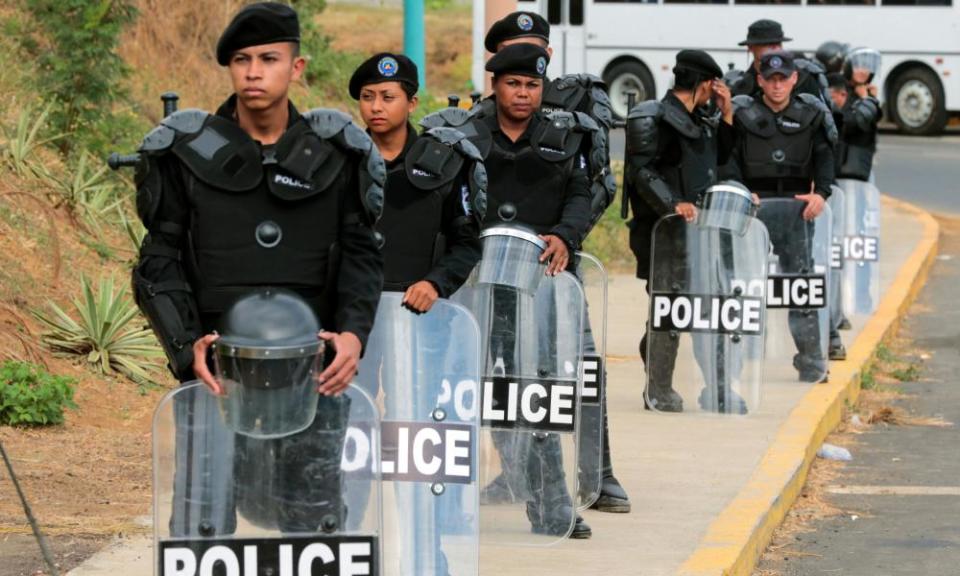Meet the musician singing against Nicaragua’s ‘apocalyptic’ regime
- Oops!Something went wrong.Please try again later.
- Oops!Something went wrong.Please try again later.
- Oops!Something went wrong.Please try again later.
His songs provided the soundtrack to the Sandinista revolution; patriotic, nostalgia-filled odes to the rebels and rifles that saved Nicaragua from imperialist tyranny.
“Mine are simple, brotherly, kind folk who sow and defend their revolución,” Luis Enrique Mejía Godoy sang in one of his most famous tributes to the 1979 armed insurrection that ended decades of US-backed dictatorship in the Latin American country.
Related: ‘We are in this nightmare’: Nicaragua continues its brazen crackdown
Fast-forward four decades, however, and Mejía is no longer singing the praises of Nicaragua’s Sandinista leaders who will seek to extend their rule in an election much of the world has condemned as a fraud on Sunday.
“It was a failed revolution – unfulfilled dreams,” the 76-year-old composer lamented at his home overlooking Costa Rica’s capital, San José, last week as Nicaragua prepared to vote.
Mejía has lived in exile since August 2018, when he fled Nicaragua after its increasingly authoritarian leaders, Daniel Ortega and his vice-president and wife, Rosario Murillo, crushed a student-led uprising with a crackdown that left hundreds dead.
“The situation touched the deepest depths of my conscience and I said to myself: ‘I have to denounce this. I have to speak out,’” remembered the silver-haired troubadour who lived in Costa Rica during the final stages of the Somoza family dictatorship before returning home to join the revolution in 1979.
Mejía’s brother Carlos, another cherished composer whose songs eulogised the Sandinista rebels, has also gone into exile in the US after denouncing Ortega’s “apocalyptic” regime.

Mejía has written hundreds of tracks about his troubled homeland in a career spanning more than half a century. But the post-crackdown phase has proved one of his most prolific, with the artist recording dozens of politically charged songs championing the young protesters who tried to topple Ortega – and the hundreds of “martyrs” who died trying.
One song salutes the Nicaraguans gunned down during the 2018 rebellion, “whose names have been engraved on the homeland’s shrine”. Another celebrates the courage of the mothers of slain demonstrators. In a third, Blues de la Patria (Homeland Blues), Mejía insists: “Killed, wounded, disappeared, arrested, kidnapped – but not defeated.”
Other compositions target Nicaragua’s “tyrannical” presidential couple, whose security forces have jailed 39 political opponents in the run-up to this weekend’s election in an apparent effort to ensure victory.
“Everyone knows it’s going to be a sham – a shameless robbery,” Mejía said, urging Nicaraguans to boycott a vote in which Ortega, in power since 2007, hopes to win another five-year term.
One recent recording, Locos de Poder (Power Crazies), describes the authoritarian bubble within which many believe Nicaragua’s leaders live in the El Carmen compound in Managua. “They live in paranoia ... even their shadows have bodyguards,” Mejía sings. “They mistrust everyone, they have no friends, they struggle to sleep, they fear waking up at their own funeral.”
The situation touched the deepest depths of my conscience and I said to myself: ‘I have to denounce this. I have to speak out’
Luis Enrique Mejía Godoy
In Este Pueblo Ya Votó (The People Have Already Voted), Mejía laments Nicaragua’s transformation into a police state but assures listeners: “There’s no evil that lasts a hundred years … The days of Ortega’s regime days are numbered.”
Older songs, written in the 70s to denounce the Somoza dictatorship, have gained new life, with Mejía tweaking his lyrics to clarify they now allude to Ortega. “I’m the composer and I have the right to do whatever I want with my work,” he said with a laugh.
More than 40 years after Sandinista guerrillas drove Anastasio Somoza Debayle from power, Mejía still has fond memories of that internationally celebrated triumph over authoritarianism.
Despite the bloodshed, “it was a moment of certain joy … Nicaragua in the 1970s was Latin America’s hope,” recollects the musician, who was a member of Costa Rica’s Vanguardia Popular communist party at the time.
But looking back, Mejía also believes there were early hints that Ortega and Murillo harboured anti-democratic instincts and dreams of “eternal” power. During the 1980s, the composer was a member of the Sandinista Association of Cultural Workers, where Murillo was secretary general, and remembers an ambitious, manipulative character “who always sought to impose her views”.
Related: Nicaraguan exiles see vote as step on Ortega’s road to dictatorship
“I don’t think they ever left the 80s. They never really accepted the idea of democratic change without guns– through free, honest, clean, observed and transparent elections,” he said of Ortega and Murillo, condemning the “madness and arrogance” of two leaders seemingly obsessed with clinging to power.
As one of Central America’s best-known songwriters, Mejía felt a duty to protest with his six-string guitar.
“It’s a risk but it’s also a privilege,” he said, pledging to be “the voice of the dead, the disappeared, the imprisoned, the tortured and the exiled”.
After three years of repression, Mejía urged leftwing foreigners, who once flocked to Nicaragua to show solidarity with the Sandinistas, to consider times had changed.
“This isn’t about left or right,” he said. “It is about violence and state terrorism against … democracy, peace and freedom.”
Additional reporting Cindy Regidor

